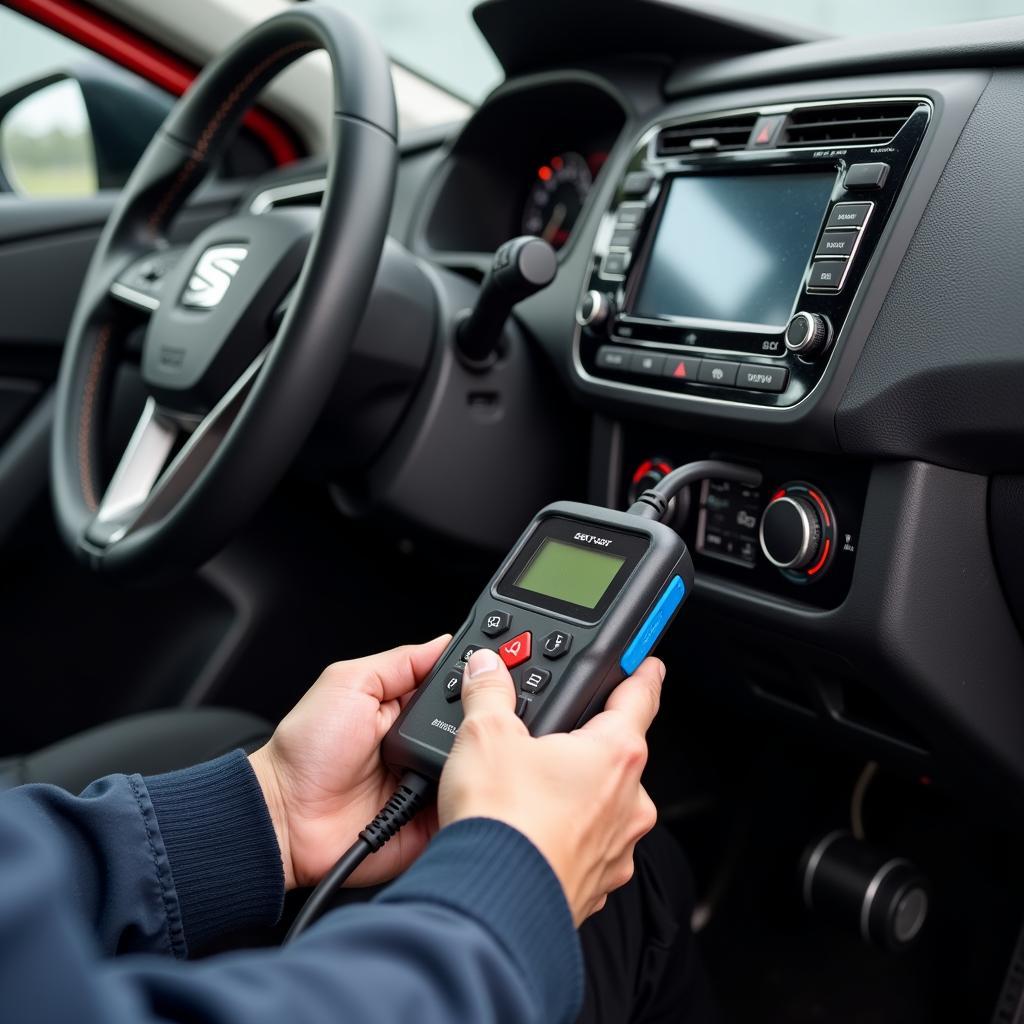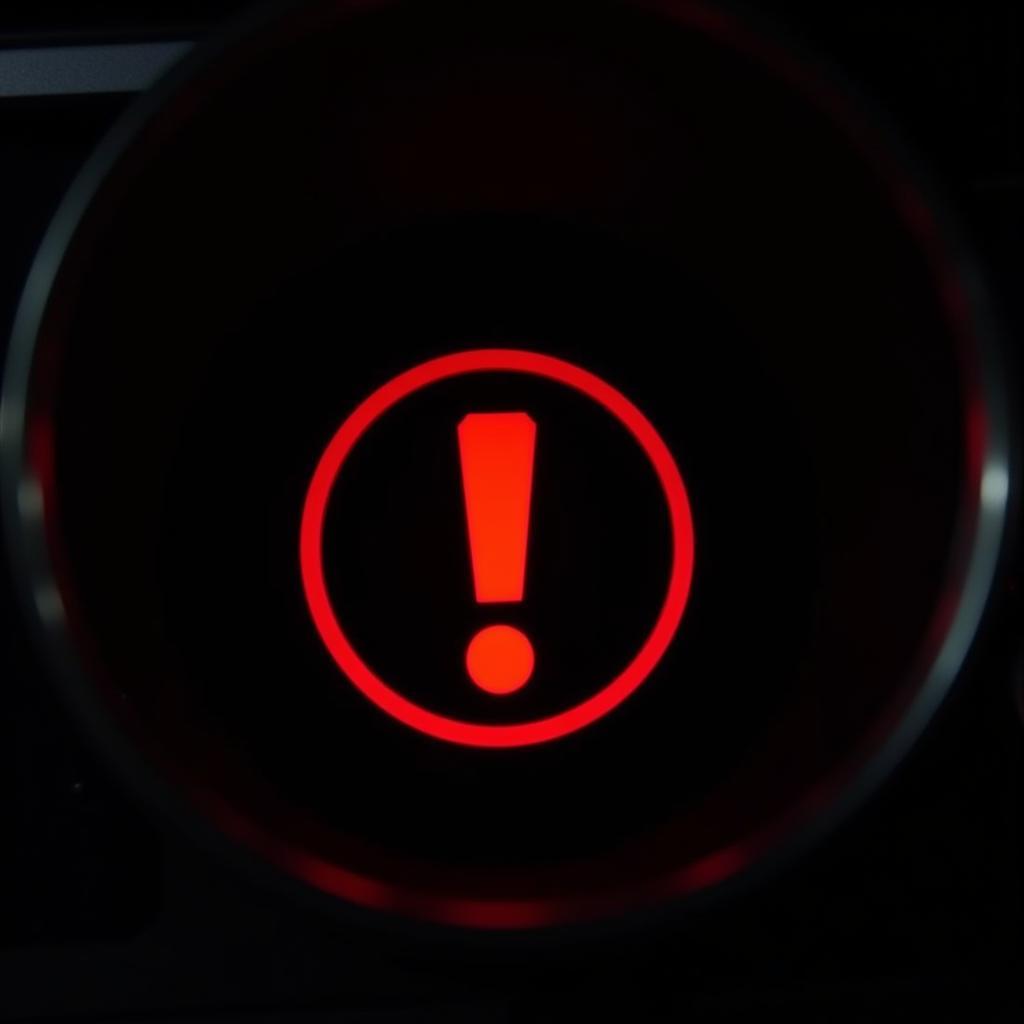The EPC (Electronic Power Control) warning light illuminating on your Seat Ibiza’s dashboard can be a cause for concern. This light signals a problem within the vehicle’s electronic throttle control system, which manages essential functions like fuel injection, ignition timing, and emissions control. Ignoring this warning light could lead to decreased performance, increased emissions, and potentially hazardous driving conditions.
What Does the EPC Light Mean in a Seat Ibiza?
The EPC light is your car’s way of telling you something is amiss with its electronic control unit (ECU) and its control of the throttle. It’s essentially a ‘check engine’ light specifically for your throttle system. A few common culprits trigger the EPC warning light in a Seat Ibiza:
- Faulty Throttle Position Sensor: This sensor relays information to the ECU about the position of your accelerator pedal, directly impacting fuel-air mixture and engine speed.
- Malfunctioning Mass Air Flow Sensor: Responsible for measuring the air entering the engine, a faulty MAF sensor can disrupt the optimal fuel-air ratio, leading to performance issues.
- Problems with the Throttle Body: A dirty or failing throttle body can disrupt airflow, causing the EPC light to illuminate.
- Issues with the Engine Control Unit (ECU): While less common, a faulty ECU can cause a range of problems, including triggering the EPC light.
What Should You Do When the EPC Light Comes On?
While it can be unsettling to see any warning light on your dashboard, it’s important to respond calmly and take the right steps to address the issue. Here’s a step-by-step guide on what to do when the EPC light appears on your Seat Ibiza:
- Don’t Panic: The EPC light itself doesn’t mean your car is about to stop working. However, it does indicate a potential problem that requires attention.
- Assess Your Driving Conditions: If the EPC light comes on while driving and your car seems to be running fine, find a safe place to pull over and stop the engine.
- Check Your Car’s Manual: Your Seat Ibiza’s manual will offer specific advice on dealing with warning lights.
- Restart Your Car: Sometimes, a temporary glitch can trigger the EPC light. Turning your car off and restarting it might resolve the issue.
- Monitor Your Car’s Performance: Pay close attention to how your car drives. Are there any unusual noises, hesitations, or a loss of power?
- Seek Professional Diagnosis: If the EPC light persists, or if you notice any changes in your car’s performance, it’s crucial to get your vehicle to a qualified mechanic as soon as possible.
 Mechanic Using Diagnostic Tool on Seat Ibiza
Mechanic Using Diagnostic Tool on Seat Ibiza
How is an EPC Light Diagnosed and Fixed?
Modern vehicles like the Seat Ibiza rely heavily on onboard computers for various functions. Diagnosing the root cause of an EPC warning light requires specialized equipment and expertise. A qualified mechanic will typically use an OBD-II scanner to read the error codes stored in your car’s ECU. These codes provide valuable clues about the specific area triggering the EPC light.
Once the mechanic identifies the source of the problem, they can recommend and carry out the necessary repairs. This could involve anything from replacing a faulty sensor to cleaning the throttle body or, in rare cases, addressing problems with the ECU.
seat warning lights and what they mean
Can I Continue Driving with the EPC Light On?
While it might be tempting to ignore the EPC warning light, particularly if your car seems to be driving normally, it’s not advisable. Continuing to drive with the EPC light illuminated could potentially exacerbate the issue, lead to more serious damage, or even put you at risk while driving. Remember, the EPC light signals a problem with a system crucial to your engine’s performance and your car’s overall safety.
Preventive Measures to Avoid EPC Light Issues
While some causes of EPC light activation are unavoidable due to regular wear and tear, there are several preventive measures you can take to minimize the chances of encountering this warning light:
- Regular Servicing: Adhering to your Seat Ibiza’s recommended service schedule ensures that potential issues are identified and addressed before they escalate.
- Quality Fuel: Using good quality fuel and avoiding contaminated fuel can help prevent a buildup of deposits that can impact engine performance.
- Air Filter Replacement: Regularly replacing your car’s air filter ensures a clean and optimal flow of air to the engine, benefiting combustion and performance.
Understanding Your Seat Ibiza’s Warning System
Being familiar with the various warning lights on your Seat Ibiza’s dashboard is essential for safe and responsible driving. While the EPC light focuses on the electronic throttle control system, other lights indicate issues with your brakes, airbags, engine coolant temperature, and more. Familiarizing yourself with these warning lights and their meanings in your car’s manual empowers you to respond appropriately and seek timely assistance when necessary.
“Regularly servicing your Seat Ibiza and promptly addressing any warning lights is crucial,” says experienced mechanic John Miller. “Early detection and intervention can prevent minor issues from snowballing into major, costly repairs down the line.”
Conclusion
The EPC warning light on your Seat Ibiza’s dashboard shouldn’t be ignored. Understanding its implications and taking prompt action is key to ensuring your vehicle’s optimal performance and your safety on the road. Regular maintenance, quality fuel, and a proactive approach to warning signs are your best allies in keeping your Seat Ibiza running smoothly.
FAQs
1. What is the difference between a check engine light and an EPC light?
While both lights indicate engine-related issues, the check engine light is more general. The EPC light specifically points to problems within the electronic throttle control system.
2. Can a loose gas cap trigger the EPC light?
While a loose gas cap can trigger the check engine light, it’s unlikely to activate the EPC light. The EPC light is generally associated with issues in the electronic throttle body and related sensors.
3. Is it safe to drive a short distance with the EPC light on?
While it might be possible to drive a short distance, it’s best to err on the side of caution and avoid driving with the EPC light on. Doing so could worsen the underlying issue or pose risks.
4. How much does it typically cost to fix an EPC light issue?
The cost of repair can vary greatly depending on the specific problem. Sensor replacements can be relatively inexpensive, while issues with the throttle body or ECU can be significantly more costly.
5. Can I reset the EPC light myself?
While it’s possible to reset the EPC light using an OBD-II scanner, it’s generally not recommended unless you’ve addressed the underlying issue. Simply resetting the light without resolving the problem won’t make it disappear and could mask a potentially serious issue.

